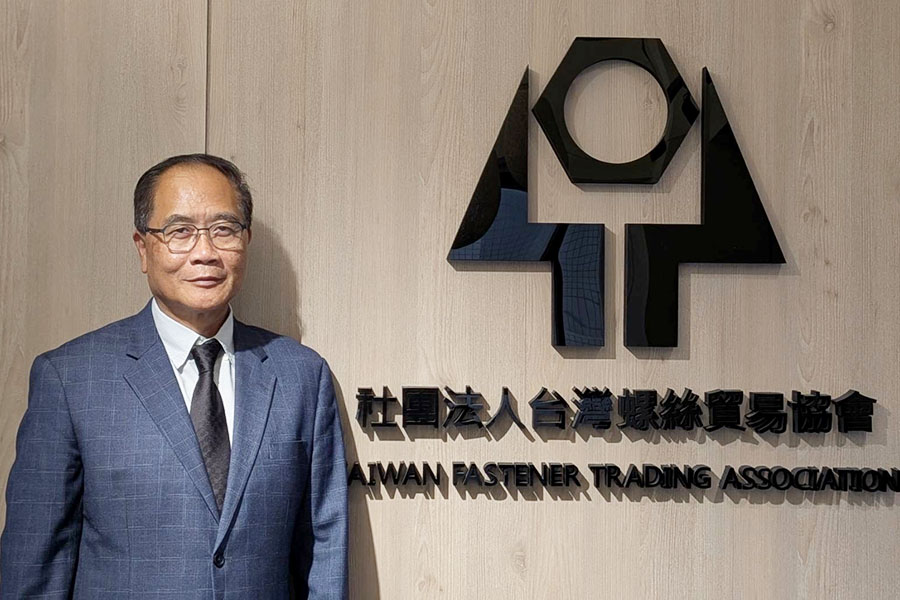GOVERNMENTS/ASSOCIATIONS/FASTENER GROUPS
TFTA Chairman ARTHUR CHIANG: Only Through Long-Term Industrial Strategies Can The Government Solidify Taiwan's Competitive Edge


Add to my favorite
2025-11-21
In 2025, Taiwan's fastener industry faces significant external challenges including U.S. tariffs, exchange rate fluctuations, rising raw material and energy costs, customer order cancellations, and the Carbon Border Adjustment Mechanism (CBAM). Internally, it grapples with a shortage of young workers, who are flocking to high-tech industries while showing little interest in basic precision industries like fasteners. This trend has led to labor shortages and a gap in the succession of skilled technical personnel. Businesses with weaker financial foundations have suffered significant setbacks amid these waves of shocks, and are reportedly resorting to measures like “working 4 days and taking 3 days off” to navigate the current difficulties. This situation has also raised concerns among many fastener manufacturers if Taiwan's fastener industry can weather these challenges and maintain its competitive edge in the future. Accordingly, TFTA Chairman Arthur Chiang shared his observations and insights on the industry's current state. He urged the government and relevant agencies to address the competitive challenges facing Taiwan's fastener industry and formulate more long-term, concrete industrial development policies to serve as the strongest backing for businesses. He noted, “Government officials must shift their mindset, for without fasteners, smartphones cannot be assembled, cars cannot hit the road, planes cannot take flight, skyscrapers cannot rise, and future humanoid robots certainly cannot be built! All these rely on Taiwan's robust technology and talent to develop and realize. We urge the government not to pour all resources into TSMC, for the fastener industry is the very root of sustainable industrial development.”
Three Key Factors Affecting the Competitiveness of Taiwan's Fastener Industry
High Tariffs
At the beginning of the year, U.S. tariffs unleashed a heavy blow on the global economy, throwing industries worldwide including the fastener sector into turmoil. The repercussions continue to reverberate to this day. Chairman Chiang believes, “Under Trump's tariffs, although Taiwanese manufacturers haven't raised their quotes, U.S. customers are being forced to increase their selling prices. This may appear to boost manufacturers' profits, but whether consumers will accept the costs being transferred to them remains uncertain. Trump's tariffs were originally intended to encourage manufacturing to return to the U.S., but at this stage, the U.S. lacks sufficient skilled workers to meet the demand. Ultimately, it still needs to rely on foreign supply chains.” In the short term, orders from the U.S. to Taiwan have decreased. However, with the Thanksgiving shopping season arriving in Nov./Dec. and the outcome of U.S.-China trade negotiations expected to be largely finalized by then, the market is projected to become clearer after January 2026. Furthermore, U.S. clients must maintain sufficient inventory to meet future production demands. Potential interest rate cuts by the Federal Reserve could stimulate consumer spending on automobiles and housing, indirectly boosting demand for fasteners. Taiwanese manufacturers need not be overly pessimistic.” However, Chairman Chiang cautioned that many European and U.S. businesses have recently gone bankrupt due to the ripple effects of tariffs, emphasizing the need for heightened vigilance regarding customer creditworthiness.
Sharp Exchange Rate Surge
Regarding exchange rates, the New Taiwan Dollar (NTD)'s sharp appreciation earlier caused significant hidden losses for fastener manufacturers. Chairman Chiang noted, “Exporters generally quote prices based on contracts, with many orders shipping months later. If the currency appreciates rapidly in a short period, it inevitably inflicts heavy losses on businesses.” Although the exchange rate has stabilized now, the recent surge where the NTD climbed from 31 to 29 against the USD within days has eroded the meager profits many manufacturers had left. Currently, Taiwanese businesses are not only relying on clients reducing orders to minimize foreign exchange losses, but are also actively implementing measures such as rotating shifts, adopting a four-day workweek with three days off, or scaling back production line operations to cut operational costs.” In the long run, Chairman Chiang believes. “As long as manufacturers can mitigate the impact through flexible production line adjustments, development in 2026 will remain promising. Beyond providing financial support to manufacturers, the government must also delve into the root causes of why companies are failing to secure orders and devise truly fundamental solutions.”
Uncompetitive Raw Material Costs
Taiwanese manufacturers have long sought to enhance their competitiveness, yet persistently high raw material costs compared to competitors remain an unresolved challenge. The persistently elevated wire prices from Taiwan CSC consistently place manufacturers at a disadvantage from the outset in terms of production costs. Chairman Chiang stated, “Carbon steel raw materials are estimated to account for 45-50% of manufacturers' production costs, with stainless steel representing an even higher proportion. Currently, wire rod costs in Taiwan are 20-30% higher than in China. Coupled with official subsidies for Chinese steel mills, Taiwanese manufacturers simply cannot compete. We do not wish to see Taiwan CSC sustain long-term losses due to price reductions, however, if Taiwan Power Company can receive government subsidies, why shouldn’t it be possible for Taiwan CSC to receive similar support? The government often encourages businesses to explore new markets, but if manufacturers are significantly disadvantaged in raw material and labor costs, where is their competitive edge? Not to mention that during economic downturns, customers may switch to other suppliers to reduce costs.”
While Quality and Technology Have been in Place, the Talent Must be Brought in as Well
Taiwan's fastener industry has long dominated the global market with its superior quality, outstanding technology, and comprehensive customer service. Many product technologies have undergone decades of refinement and development, achieving significant advancements. In his keynote address at this year's EIFI and EFDA member conferences in Europe, Chairman Chiang specifically highlighted several advantages of sourcing fasteners from Taiwan, including consistently superior product quality that avoids “troublesome” issues, FedEx-like delivery efficiency, and fully accountable customer service. This reflects the mutual trust and collaborative synergy cultivated over many years between Taiwanese suppliers and their global clients. Chairman Chiang also highlighted a looming concern regarding the succession of industrial technology in Taiwan. He noted that “under the government's vigorous promotion of high-tech industries, basic precision industries like fasteners have been neglected. The expertise in these basic precision industries requires long-term cultivation and accumulation. Once the current generation of master craftsmen in their 40s and 50s, who possess mature skills, retire, a talent gap may emerge.” As high-tech professionals constitute only a minority among Taiwan's workforce, if the government can guide the majority of non-high-tech workers toward basic precision industries, these sectors will avoid facing a shortage of successors.”
Traders Serve as the Driving Force for Manufacturers to Expand Globally
Manufacturers aiming to expand exports must understand that securing orders is only the beginning. They must also grasp their customers' true needs and priorities- an area where trading companies can provide invaluable support. Chairman Chiang stated, “Beyond possessing extensive knowledge of product technology and industry trends, traders must also have the communication skills and experience to engage with clients effectively. This enables them to help manufacturers uncover new market opportunities. Currently, TFTA is actively engaging with agencies such as the Industrial Development Bureau (IDB). We hope to leverage official resources such as regularly produced market reports to assist businesses in identifying expansion targets and broadening the marketing reach of Taiwanese fasteners beyond traditional markets like Europe and the U.S. to emerging markets.” Chairman Chiang believes that for Taiwan to survive amid fierce competition from numerous rivals, it must take more proactive and forward-looking actions; otherwise, it will merely amount to empty sloganeering.
CBAM to Take Effect in 2027; Businesses with Carbon Reduction Plans Will Gain Competitive Edge
The current issue with CBAM is that no clear information has been released regarding which entity will handle reporting and certification. It remains undecided whether the EU will designate a specific body or authorize other certification bodies. Previously, EFDA proposed to the EU that reporting requirements should be limited to upstream raw material suppliers of major emitters, but this matter also remains unresolved and awaits further announcement from the EU. Chairman Chiang believes, “Although supporting details remain to be announced, carbon reduction is an inevitable path for the industry's future. Manufacturers can pursue various green certifications such as ISO 14000 or 14064 to achieve cost reduction objectives. On the other hand, this also grants them priority when clients select partners, creating a competitive edge for themselves. Additionally, with ample time remaining before the CBAM formally imposes taxes in 2027, businesses can leverage government resources to proactively prepare for automation upgrades and transformation. We also encourage second-generation successors with innovative perspectives to engage in dialogue with government agencies and academic institutions, working together toward shared industrial development goals.”
(✽To promote networking among association members, TFTA will hold its members meeting at Queena Plaza Hotel in Tainan on December 12, 2025.)
台灣螺絲貿易協會
蔣國清理事長
扣件
政府支持
關稅
匯率
原料成本
CBAM
人才培養
會員大會
TFTA
Chaiman Arthur Chiang
fastener
governmnet support
tariff
exchange rate
material cost
talent cultivation
member assembly
扣件
國際展會
惠達雜誌
匯達實業
外銷媒合
廣告刊登
螺絲五金
五金工具
緊固件
台灣扣件展
印度新德里螺絲展
越南河內螺絲展
墨西哥瓜達拉哈拉螺絲展
美國拉斯維加斯螺絲暨機械設備展
2026美國鳳凰城螺絲暨機械設備展
波蘭克拉科夫螺絲展
義大利米蘭螺絲展
德國司徒加特螺絲展
德國杜塞道夫線材展
Fastener
Hand Tool
Hardware
Component
Fastener World
Wire Dusseldorf
Fastener Fair India
Fastener Fair Vietnam
Fastener Fair Mexico
Fastener Poland
Fastener Fair Italy
IFE
Fastener Fair Global
Chicago Build
READ NEXT

Subscribe







